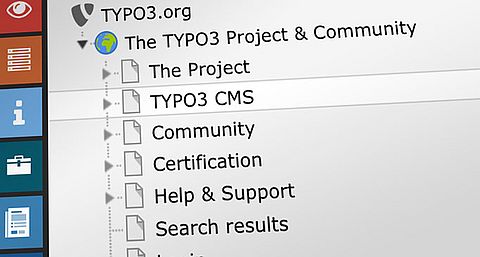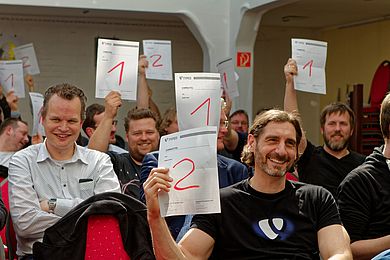In The Importance of Trust, I explained that the TYPO3 Association is quite a specific organization - it's a global organization structured into teams made up of individuals from different countries, cultures and time zones. We work together all year long, but sometimes we only have the opportunity to meet in person once a year. From time to time, this distance can fuel disagreement. In these days of remote work, it is increasingly important to learn interpersonal skills to manage disagreements in the best possible way, to prevent them from degenerating into conflict.
If poorly managed, disagreements and relational tensions can escalate into conflict. Conflict is a psychosocial risk factor with significant human impacts (stress, burnout, etc) and economic consequences (loss of efficiency, work stoppages, early departures, etc).
Mediation is a fast and effective way to prevent conflicts from breaking out, and for finding solutions to latent or proven conflicts, at a controlled cost - usually borne by the organization.
Defining Harmony
In music, harmony is the perception that various sounds concur or go well together, for example, when music played by several instruments at once sounds harmonious. From a philosophical point of view, harmony can be considered as the idea that all elements of a whole are in their proper place, so that the whole is better than the sum of its parts. Harmony is therefore a structural property of the whole. In a work context, these definitions are very interesting, because we understand that it's not only about the well-being of individuals, but also the result of what they're building together.
Why Harmony Is So Powerful
It may seem obvious that harmony is a prerequisite for the smooth running of an organization. Yet this harmony is often the first to be sacrificed in the name of competitiveness - which is totally counterproductive. If you're not yet convinced of the extreme importance of maintaining harmony in a work context, let's look at the consequences of the absence of harmony: wasted time and energy managing conflicts, loss of confidence, and most significantly, loss of motivation. Motivation is a bit like the natural fuel generated by individuals. If we can't do anything to increase it, we must do everything we can not to damage it. Let's just say that harmony has this power to keep the different motivations in the best conditions, like a good amount of sunshine and water.
Defining Mediation
Mediation is the process of a third-party facilitator assisting two or more people in disagreement to prevent or resolve conflict, or settle a dispute. It is usually conducted by means of confidential discussions (individual or collective).
Mediation is first and foremost a posture: it consists of accompanying the protagonists, in an impartial, neutral way, to make the other party's position heard, without influencing the outcome, in a climate of mutual respect and listening, and within a strictly confidential framework.
Unlike an arbitrator, conciliator or negotiator, the mediator has no decision-making power to settle the dispute, or influence or impose a decision.
In this way, mediation makes it possible to break out of the traditional framework of opposition or avoidance, and restore collective harmony.
Mediation is a structured process, based on the will and autonomy of the protagonists, who can opt out at any time. It is most effective when it is in the interests of both parties to maintain a lasting relationship, or even to part ways under mutually agreed conditions. It should therefore be initiated as far upstream as possible, before the consequences of the conflict become irreversible.
The Key Factors for Successful Mediation
A successful mediation is one that leads to a lasting "win/win" outcome, thanks to the emergence of a "consensus" acceptable to everyone. For mediation to be as beneficial as possible, it must reflect free, informed and genuine consent from start to finish. To achieve this, the mediator should:
- Identify unspoken disagreements, and bring them to the table before they become open conflicts.
- Allow the protagonists to come clean, to express their positions and grievances to the end.
- Be empathetic, understanding everyone's position if it differs from their own opinion.
- Identify their own blinkers and opinions, and discard them, without trying to convince others.
- Identify hidden needs and issues, to understand if the conflict is a symptom of something else.
- Co-construct an action plan, worked out jointly by the protagonists, leading to a concrete outcome.
Introducing the TYPO3 Community Mediation Policy
As a member of the TYPO3 Board, I am responsible for maintaining a governance model for official bodies (teams, committees, board, etc.) and documenting a transparent communication model between them. What is expected of me includes documented processes, consensus-driven decisions, professional communication, consequence management, etc. Implementing a policy for managing conflicts of interest is one of the first steps in building healthy and transparent corporate governance.
The TYPO3 Community Mediation Policy aims to provide arbitration, mediation, and general help in conflict resolution; create an environment that is open to feedback (including complaints), and resolve any complaints received. This process consists of two possible levels when aiming to resolve a conflict: a first level of internal resolution called the Complaint Handling Process, and if this is unsuccessful, a second level of resolution with the help of external mediation called the Dispute Resolution Process.
View the TYPO3 Community Mediation Policy
The Board is continuing its work to set up processes and better structured teams and committees. Stay tuned!





